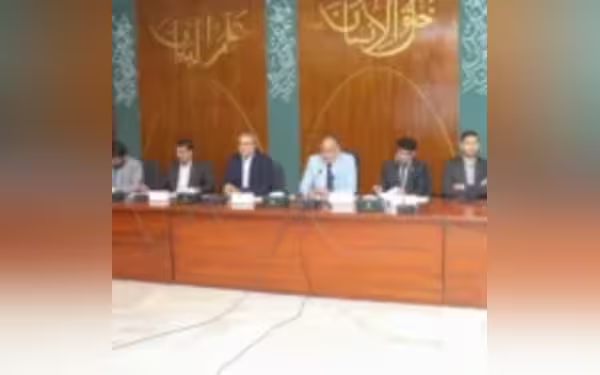Saturday, November 16, 2024 05:55 PM
CDWP Approves Rs187 Billion Development Projects for Pakistan
- CDWP approves projects worth Rs187 billion for infrastructure.
- Key health initiatives include new medical college and emergency center.
- Focus on water resources and economic development in Balochistan.
 Image Credits: pakistantoday
Image Credits: pakistantodayCDWP approves Rs187 billion for vital development projects, focusing on health, infrastructure, and water resources across Pakistan.
The Central Development Working Party (CDWP) has recently taken a significant step towards enhancing Pakistan's infrastructure and public services by approving development projects worth a staggering Rs187 billion. Chaired by Minister for Planning Ahsan Iqbal, this meeting brought together key figures from the Planning Commission, federal ministries, and provincial governments to discuss the pressing need for cost optimization in light of the country's economic challenges.
Among the approved projects, six were immediately greenlit for initiation, totaling Rs19 billion. The remaining six projects, which amount to Rs168 billion, have been recommended to the Executive Committee of the National Economic Council (ECNEC) for final approval. This careful selection process underscores the government's commitment to judiciously utilizing resources to address the needs of the nation.
Noteworthy projects include vital health sector initiatives such as the “Establishment of Mohtarma Benazir Bhutto Shaheed Medical College Mirpur AJ&K” with a budget of Rs5.08 billion, and the “200-bed Accident and Emergency Center at Pakistan Institute of Medical Sciences (PIMS)” in Islamabad, which is set to cost Rs6.63 billion. Additionally, the “Replacement and Upgradation of HVAC Equipment at PIMS” has been allocated Rs1.65 billion, showcasing a strong focus on improving healthcare facilities.
In the realm of industries and commerce, the project titled “Invest Pakistan” has been approved at a cost of Rs1.39 billion, aiming to boost economic activity and investment in the country. Furthermore, the “Karachi Water & Sewerage Services Improvement Project (KWSSIP) Phase-I,” valued at Rs25.47 billion, has been recommended to ECNEC. This project, funded by the World Bank and the Sindh Government, is expected to significantly enhance water and sewerage services in Karachi.
Other significant projects include the “Greater Water Supply Scheme for Central Hunza from Attabad Lake” at Rs2.08 billion and a road infrastructure project connecting Baltistan and Diamer-Astore divisions, which has a budget of Rs12.3 billion. These projects are crucial for improving connectivity and access to essential services in remote areas.
The CDWP also approved a project for procuring Aircraft Rescue and Fire Fighting (ARFF) vehicles for the new Gwadar International Airport, costing Rs2.08 billion. Additionally, a 155-km road construction and upgrading project from Dirgi Shahbozai (N-70) to Taunsa Sharif (N-55) in Balochistan and Punjab has been recommended to ECNEC, with a budget of Rs11.55 billion. This infrastructure development is vital for enhancing transportation and trade routes.
Moreover, a revised project for the “Ziarat More-Kach-Harnai-Sanjavi Road” in Balochistan, valued at Rs24.42 billion, has been referred to ECNEC following third-party validation. Ahsan Iqbal emphasized that projects in Balochistan are a priority for the federal government, reflecting a commitment to addressing the unique challenges faced by this province.
In addition to these projects, two significant initiatives related to water resources were forwarded: the “Sindh Flood Emergency Rehabilitation Project (Irrigation Component)” worth Rs59.91 billion. This project aims to repair irrigation and drainage networks damaged during the 2022 floods and construct flood detention dams to prevent urban flooding. Both projects are proposed to be funded by the World Bank and the Sindh Government, highlighting the importance of international collaboration in addressing local challenges.
The approval of these development projects by the CDWP marks a pivotal moment for Pakistan as it seeks to address its economic challenges and improve public services. With a focus on health, infrastructure, and water resources, these initiatives are expected to have a lasting impact on the lives of citizens across the country. As the government moves forward with these projects, it is essential to ensure transparency and efficiency in their execution to maximize the benefits for all.













